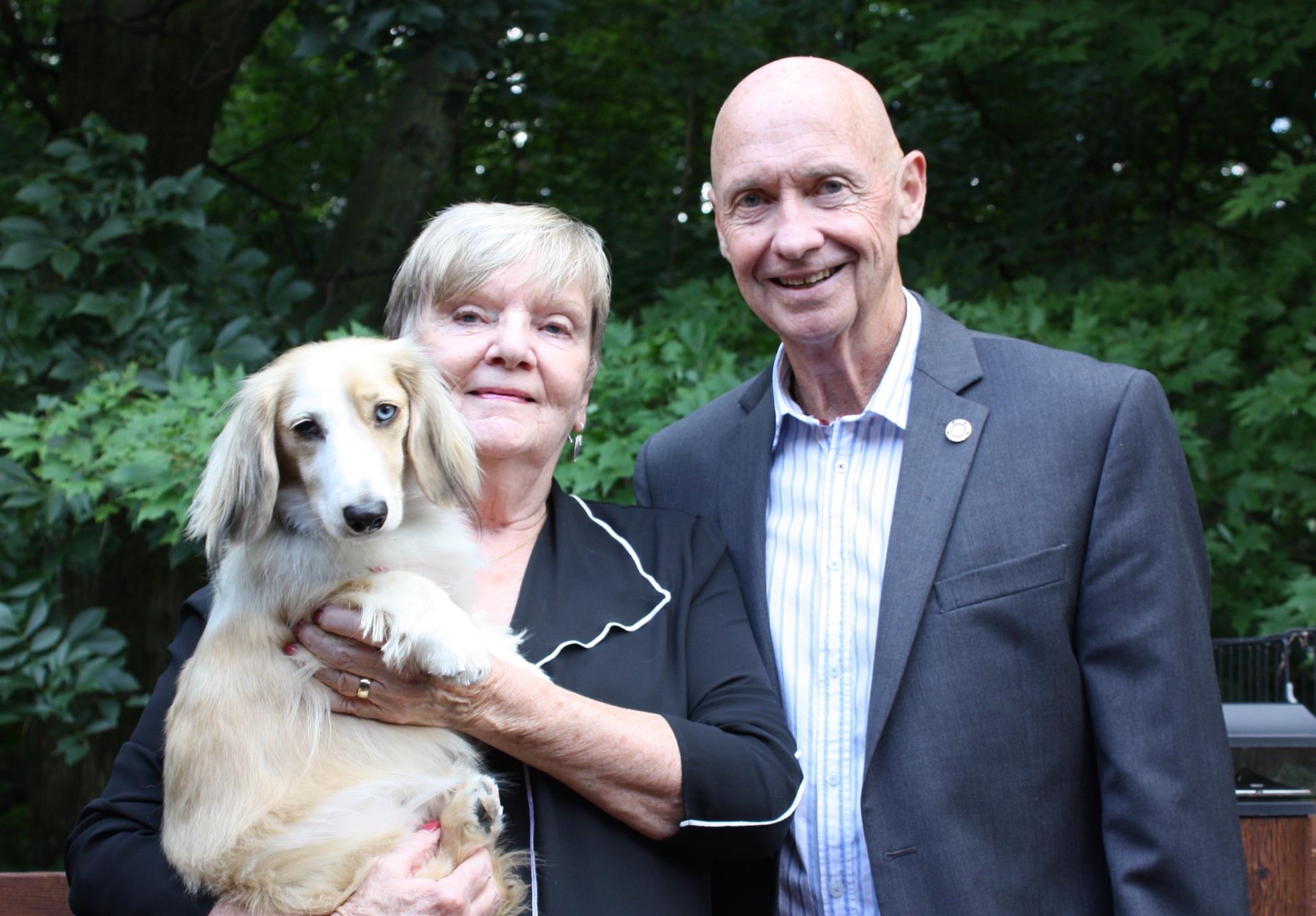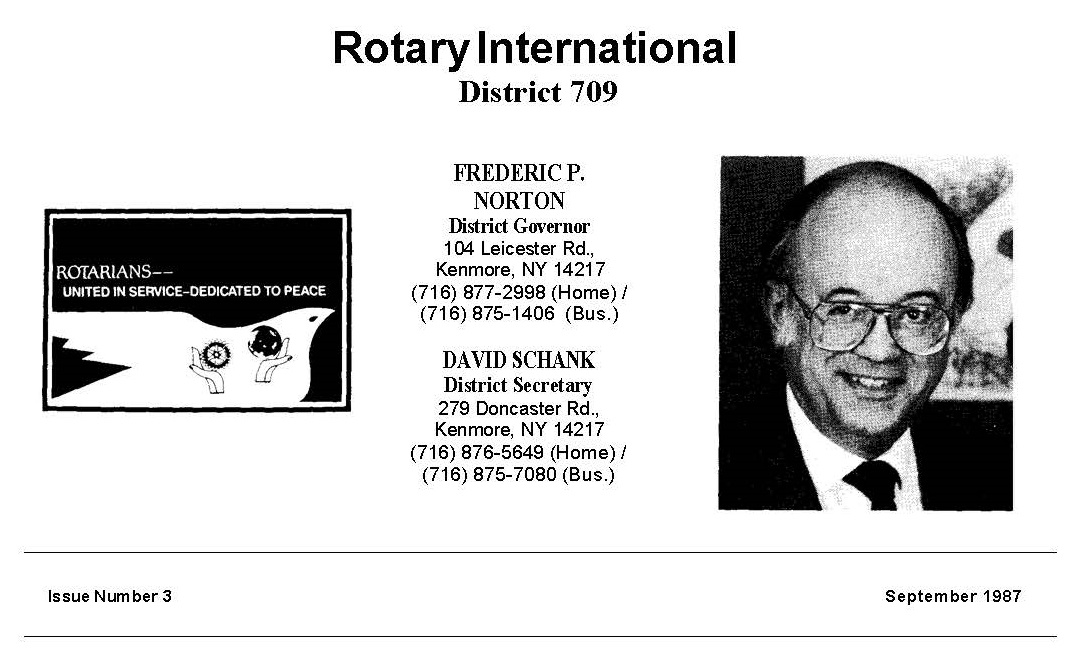This issue is an every member issue. As last year there wil1 be two such issues. In we would like to convey some special thoughts to you, the club members, who are in the trenches and are the backbone of Rotary.
Fail...
At the district assembly this year, we asked each president, as an additional challenge, to fail at least 12 times. That was not a crazy request. One of the basic problems in every organization is the members who point out that an idea won't work. They always seem to sit in the rear of the room. (Have you ever noticed that no one ever sits in the front row of the room!) Yes, we have a lot of doubters! But failure is the foundation of success. Paul Ehrlich was a person who failed. He decided to develop a serum that would kill the microscopic wiggly things which caused a feared disease. The first serum he concocted failed. The second was no better. When he reached the century mark he still had failed. Two hundred serums later and nothing. In fact, when he reached the 605th formula, his record was O out of 605. 606 worked and that was Salvarsan the drug which cured syphilis, a disease that was the "Aides" of its day. His final record 1 and 605! In football or hockey, no coach would have survived with that record. But Paul Ehrlich was awarded the Nobel Prize for medicine in 1908 and is the father of modern chemotherapy. Life is not to be judged as we would a hockey season!
In Order To Succeed...
In order to survive the effects of this decade's changing society, we have many challenges before us as Rotarians. The first challenge is upon us - Polio Plus. The next challenge is upon us too, but we don't see it. It is hidden from us because we see the wondrous growth in the number of Rotarians worldwide. Unseen is the ominous fact that there are fewer Rotarians in North America. In the face of a major decline in the birth rate (Have you extrapolated from the times when fewer students required the closing of schools to the time when those students are of Rotary age?) and the increased need of third world countries for help, we have to maintain our membership rolls and increase our aid programs. This will take courageous and original thinking. We cannot afford to fear failure. We must seek failure to succeed. That is the wonder of Paul Ehrlich. For each of those 606 formulations, he put much creative thinking and he built on his failures. That is what we will have to do in the decade ahead. We will have to try many different ideas to attract new members.
Because Women ...
One issue we must face is women. Not only new members but the women we have in the Rotary family now! Our spouses. There has been a tremendous change in the attitudes of women as to themselves. I am not sure I understand it, but then that's why I married Alex. I leave understanding women to Alex. But I have noticed that the newer generations of women prefer to be called "women" rather than "ladies" and "Rotary Anns".
....well, ask them about that label! They prefer to make the decision themselves as to their involvement in things Rotary. Some even prefer Scotch to Tea! When they are in the workforce they enjoy the traditional competition for improvement and resent having to prepare the meal when they get home. In terms of Rotary, this will have meaning because none of us would be Rotarians if our spouses said "no." If you have time, think about this. If the birth rate is 50% of what it was twenty years ago, and if the professional and management workforces are fifty percent women, how will your club sustain its present membership in the decades ahead?
and Future Leaders require it...
Frankly, I am deeply disturbed by the thought that the real issue facing Rotary in the next decade may not be should we bring women into Rotary, but will they come into Rotary? If that is the reality, that will be a major challenge! As Alex and I have traveled among the clubs in the district we have been very impressed with the commitment to the community and surprised at the lack of commitment to the individual club. This is another challenge. Like the lawyers who die without a will, we often neglect our own houses. That should not be a product of Service above Self. Club organization is often at best casual. There are many presidents with little experience in Rotary leading clubs filled with past presidents. There are even clubs where the president is elected by the directors who, in turn, are appointed by the president. Where is the club constituency for decisions affecting the future? If the presidency is a chore to be given only to the newest members, where 1s the prestige of the office of president? The presidency should not be the means by which a new member learns about Rotary. The organizational traditions of each club will be the soil for future growth. We need constant renewal through new and younger members. When you enter the room for your weekly Rotary meeting what do you see? Is the room filled with active doers or of people retired from thinking, afraid to fail in the face of challenge, or a large group of past presidents led by a youngster learning about Rotary in lieu of a fireside chat? When a club appears messy or old, how can it attract new members? Do you see the challenge to Rotary this year? It is your attitude! What have you done for Rotary this year? What do you plan to do for Rotary this year, next year, and each year thereafter?


 Dear District 7090 Rotarians,
Dear District 7090 Rotarians,